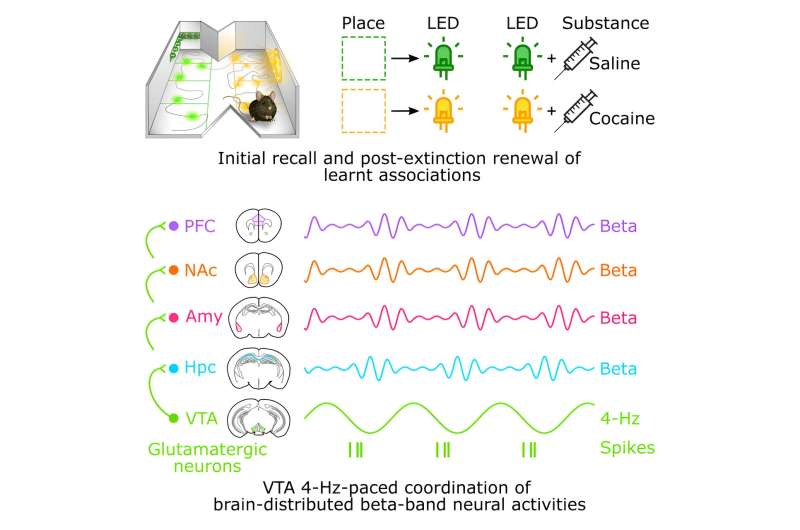This article has been reviewed according to Science X's editorial process and policies. Editors have highlighted the following attributes while ensuring the content's credibility:
fact-checked
peer-reviewed publication
trusted source
proofread
Research uncovers mechanism behind stubborn memories

Researchers from the Medical Research Council Brain Network Dynamics Unit at the University of Oxford and the Nuffield Department of Clinical Neurosciences have identified a novel mechanism by which the brain produces powerful, lasting memories that drive ill-advised actions.
Focusing on cocaine experience, the researchers demonstrate how the collective activity of many nerve cells distributed across the brain underlies the persistence of such memories, providing new insights into why drug-seeking behaviors could lead to addiction.
It is already known that many recreational drugs produce particularly powerful memories, which associate the experience of drug use with surrounding information, such as what the user was doing at the time or where they were. However, it is not clear how such robust memories are formed in the brain. Using mice, the researchers were able to identify a special pattern of nerve cell activity that is responsible for the re-occurrence of these abnormally strong memories.
The researchers suggest that a possible explanation as to why certain unwanted memories are abnormally strong may be because those memories leverage the large-scale cooperation between multiple brain regions. The researchers chose to focus on the cocaine experience to model a salient experience that alters behavior and one with obvious implications.
By monitoring populations of nerve cells, they observed that increased activity simultaneously in diverse brain regions predicted the expression of robust and lasting memories. Toning down this heightened activity allowed more appropriate behavior to return.
The first author of the research paper, Dr. Charlie Clarke-Williams, said, "A fundamental operation of the brain is to internally represent information related to life experience in our environment. This principle usually ensures that we interact with the world in the most suitable manner. However, in the case of experiencing drugs of abuse like cocaine, this natural mechanism is hijacked and can lead to inappropriate actions and, ultimately, addiction."
"Here we explored how populations of nerve cells distributed across the brain cooperate to underlie strong memory."
Senior author Professor David Dupret added, "Recreational drug use is a widespread problem in our society, impacting the lives of many people and placing a strain on our health care system. Memories should be balanced. Weak memories are often observed in aging or dementia."
"But at the other end of the spectrum are abnormally powerful memories, which are characterized by unfiltered information processing. Strong memories that can drive inappropriate actions are seen in a wide range of brain conditions, such as drug addiction or post-traumatic stress disorders. This research provides a vital new understanding of how these memories are created in the brain, an important step in identifying new targets for treatments."
The full paper, "Coordinating brain-distributed network activities in memory resistant to extinction," is published in Cell.
More information: Charlie J. Clarke-Williams et al, Coordinating brain-distributed network activities in memory resistant to extinction, Cell (2024). DOI: 10.1016/j.cell.2023.12.018




















